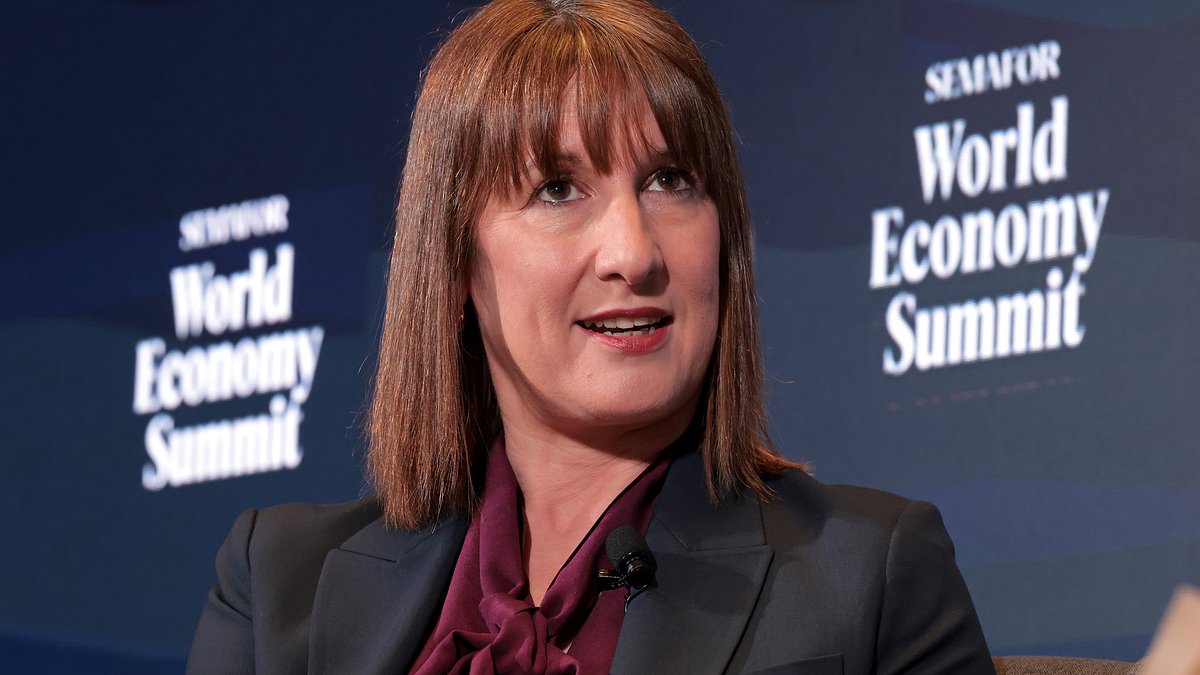Rachel Reeves today insisted there is hope of a US trade deal as she insisted a visit to the US was about more than just ‘damage limitation’ from Trump’s tariffs.
The Chancellor is in Washington for IMF meetings and talks with other G20 finance ministers to discuss the US president’s dramatic impact on global commerce.
Appearing at Semafor’s World Economic Summit in Washington, she said she had been told by the Trump administration it was ‘keen to do a deal with the UK, reflecting the closeness of that relationship’ between the two countries.
Fears are mounting for the UK economy today after a closely-watched index showed the worst slowdown in more than two years.
The flash PMI survey for this month found activity has dropped amid Donald Trump‘s trade tariffs and the impact of Labour’s national insurance hike.
Ms Reeves suggested that she would look to go beyond a deal on tariffs, including a ‘technology partnership’ and ‘building on the close relationship we have on security and national defence’.
She said: ‘This isn’t just about damage limitation, it’s also about what the next step is.’
Adding that she would like to see a reduction in tariffs and non-tariff barriers on both sides of the Atlantic, Ms Reeves said: ‘I think that can be a bilateral process between our two countries to remove those remaining trade barriers that do exist, and if we work on that basis there is a deal to be done that will benefit industry both in the UK and the US and jobs in our countries as well.’
The S&P Global composite index gave a reading of 48.2, down from 51.5 in March – with anything below 50 representing contraction.
It was the lowest since November 2022, significantly weaker than the 50.5 analysts had pencilled in, and would be consistent with GDP declining 0.3 per cent over a quarter.
The grim data will fuel concerns that Rachel Reeves’ efforts to get the economy growing are not working.
Separate figures released this morning revealed public sector borrowing has been running far above forecasts – sparking renewed warnings that the Chancellor will be forced to raise taxes again or cut spending later this year to balance the books.
Ms Reeves is in Washington for IMF meetings over the next few days, where she will try to make progress on a trade deal with the US to reduce the impact of tariffs on British businesses.
PMI survey respondents in both the factory and services sectors said weakening demand from abroad hit their business activity, with new international work falling at the fastest pace in nearly five years.
Employers also made job cuts across the economy in April, with staffing numbers falling for the seventh consecutive month.
Meanwhile, optimism for the year ahead fell to its lowest point since October 2022, with many survey respondents citing worsening conditions in the wake of US tariffs.
Manufacturers saw a fall in production for the sixth consecutive month with the latest decline the steepest since August 2022.
The flash PMI is an early reading from the survey and can be revised.
Chris Williamson, chief business economist at S&P Global Market Intelligence, said the rate of job cutting was ‘aggressive’, and that the survey result ‘reflects the impact of headwinds from both home and abroad’.
‘While recent months have been characterised by UK businesses treading water, broadly stagnating since last autumn’s Budget, businesses are reporting more of a struggle to keep their heads above water in April,’ he said.
‘April’s fall in output was the largest recorded for nearly two and a half years, consistent with GDP declining at a quarterly rate of 0.3 per cent, reflecting falling activity and demand across both manufacturing and services.’
He added : ‘The biggest concern lies in a slump in exports amid weakened global demand and rising global trade worries, but higher staffing costs have also piled pressure on companies – linked to the National Insurance and minimum wage changes that came into effect at the start of the month.
‘Just as export orders are falling at the sharpest rate since May 2020, during the pandemic lockdowns, firms’ costs spiked higher to a degree not seen for over two years.
‘The collapse in confidence and drop in output during April raise red flags as to the near-term economic outlook and add pressure on the Bank of England to reduce interest rates again at its May meeting.’
